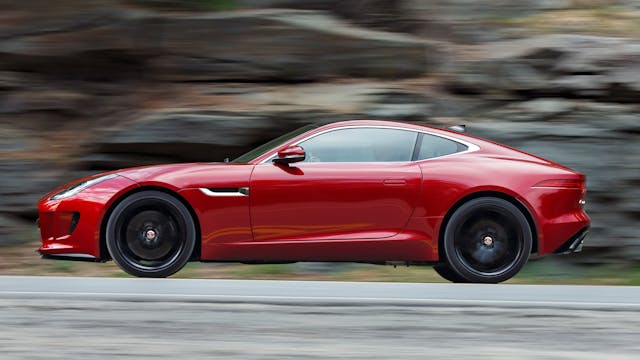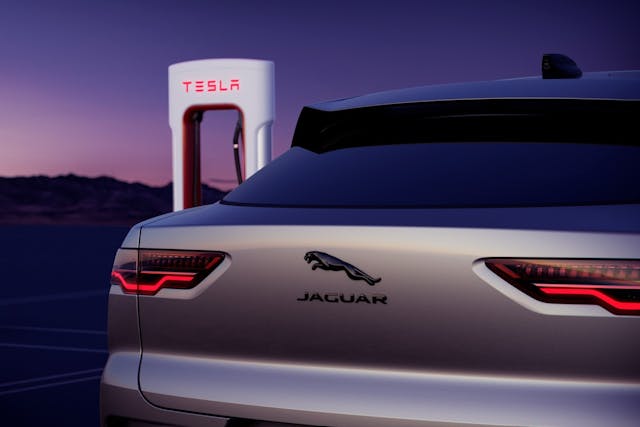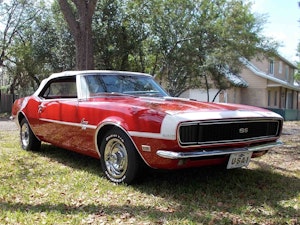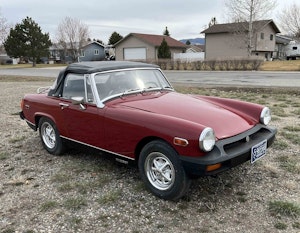Media | Articles
The End Is (Very) Near for Gas-Powered Jaguars
We’ve known for some time—and you have too if you’re a regular reader—that Jaguar, as we know it, is in trouble. Sales have cratered, the dealer network is shrinking, and future electric products may or may not connect with current Jaguar enthusiasts, who are a dying breed.
The uncertainty facing the brand has even negatively affected the Jaguar collector car market. “Jaguar, as a brand, is on the rocks,” according to a story we published last month. Vintage Jaguars, the story says, “are getting harder to sell, and over the past five years many prices are either stagnant or decreasing.”

“On the rocks” may be a strong statement, but a story in Road & Track suggests that it may not be inappropriate. As the brand moves to an all-electric future—sooner, rather than later, in 2025—the transition, so far, looks rocky. An interview with Joe Eberhardt, Jaguar Land Rover’s North American president and CEO since 2013, makes it apparent the brand realizes it is alienating core Jaguar enthusiasts.
“Obviously we don’t want to leave anybody behind, especially since the brand has such a history,” Eberhart told the magazine, “but there does come a point where you just need to focus on the future. It may not be a brand for everybody, and that’s by design… I can’t tell you exactly what percentage of current Jaguar owners we will leave behind, but clearly given the positioning of the brand and the vehicles we will lose some clients along the way. It’s a difficult decision to make, but brands need to be focused and to decide what their purpose is. We just knew that we didn’t want to be another volume luxury brand, that is not something that aligns with the Jaguar philosophy.”

Jaguar and Land Rover have been owned by Mumbai, India-based Tata Motors since it bought the brands from Ford in 2008. Ford had no real clue what to do with the Jaguar and Rover, and many in the industry assumed that when they were obtained by Tata, the storied past of each brand may be lost. But Tata has been a patient benefactor: It essentially allowed both Jaguar and Land Rover to proceed on the path that seemed the most natural.
Marketplace
Buy and sell classics with confidence
That turned out to be the correct strategy for Land Rover, which is a fully realized brand, but not Jaguar. R&T points out that sales of Land Rover’s products this past year totaled nearly 280,000. During that same period, Jaguar’s global sales were fewer than 43,000. Contrast that with 2017, when Jaguar sold 179,000 vehicles.
Jaguar Land Rover announced a year ago that it would invest more than $19 billion in the company’s “industrial footprint,” which, when it comes to Jaguar, means electricity. So Jaguar is bent on changing direction. Three years ago, when electric power seemed like a near-immediate solution, Jaguar said it would go all-electric by 2025. Now, when other manufacturers are dialing back electric production based on slowing sales, Jaguar is forging ahead. According to Jaguar’s website: “Jaguar will transform into an all-electric luxury brand by 2025, with uniquely expressive vehicles defined by pioneering technologies and visionary design.”
Jaguar is initially planning on at least three electric vehicles, the first being a “four-door GT” that the company announced a year ago. It will have a starting price of $124,000, Jaguar said.

The F-Type, powered by a 5.0-liter supercharged V-8, starts at $77,900, and is still selling well into its concluding year. “F-Type celebrates the final model year, and 75 years of Jaguar sports cars,” Jaguar says. If that sounds like this is the end of 75 years of sports cars, that may be true.
“The majority of our products cease production in June, but they will be on sale for a much longer time,” Eberhart said. “We will have a production schedule that enables us to have a continuous supply of vehicles until the new cars come… We’re trying to time it so we have enough volume to take us through to the launch of the new product and have a clean handover.”
The brand’s U.S. dealer network is also taking a hit. Eberhart told R&T that “more than 40 have already voluntarily surrendered their franchises.” All Jaguar dealers will be integrated into the Land Rover network, if they aren’t already, leaving “between 120 and 130” dealers that sell all the Jaguar-Land Rover products.
One thing is clear: That Jaguar internal combustion engine’s exhaust note will live on, perhaps, as we told you last July, but only in a library.
***
Check out the Hagerty Media homepage so you don’t miss a single story, or better yet, bookmark it. To get our best stories delivered right to your inbox, subscribe to our newsletters.















I had heard Tata Motors was only going to sell big Jaguars and big Land Rovers because everybody likes big TaTas.
Lol
After the “success” of I pace it could be more accurate to say The End Is (Very) Near for Jaguar.
Going all electric will nail the coffin shut for Jaguar. Total lunacy. And very sad for such an iconic brand. Ford has already figured it out and pulled back on electric. No true automotive enthusiast will help Jaguar survive but buying an overgrown golf cart.
I hope the mistaken move upmarket and fully electric kills Jaguar very quickly. I was going to buy a new XF but I refuse to give them one cent now that they’re really going through with voltage suicide.
I can clear up a little of Joe Eberhardt’s confusion. He has lost 100% of this Jaguar owner. I have 3, all supercharged ranging from a 2007 XKR and 2004 XJR to a 2009 Super V8 Portfolio. Won’t touch anything newer. And I have no use for their dealers. I am the warranty.
It would appear that Jaguar has been intent on suicide for many years. Glad I have some examples from a brief period when they had their head on straight.
I’m in the same boat intentionally and exactly.
06 Xkr 08XJR. 06 Xjr.
Well let’s face it. ICE vehicles are on the way out in favour of much better performing EVs and that’s what people want. Walk into any legacy auto dealership and you’ll find bored salesmen snapping their fingers. I went to Tesla dealer and there was a lineup of customers. They told me they had “52 cars to deliver today”. Jaguar is preparing for the electric future. Make an F Pace EV and it should sell.
Contrary to the apparent consensus, I was highly disappointed when Jaguar cancelled the electric XJ replacement on the eve of its reveal. I’m on my second, a 2011 XJL, and with 137,000 miles on it, I’m beginning to look into its future replacement. I really would like to go all electric, the main impediment being the woeful lack of infrastructure build out in my state (Mississippi). Sadly, an opening price of $125,000+ will be a greater deterrence.
I feel “The End Is (Very) Near for Jaguar” is the more correct title. I have no interest in Jag’s future products.
A crying shame. I’ve loved Jaguars since I was a kid. I’ve owned vintage Jags and modern Jags. I have ZERO interest in what they say they’re planning. Sadly, I can’t imagine they’ll survive this.
Back when I was Product Manager for BMW and Jaguar was a worthy competitor, we wanted a strong Jaguar as it helped protect the overall luxury market in the UK. But, from experience, how many people are there in the marketplace that can afford (or want) a car costing well over $100,000..? This is a small segment of the overall and is hotly contested already. Sadly, without a significant volume of sales, Jaguar is dead in the water. Don’t their senior management team look at the segment volumes….?
Unfortunately what the article fails to mention is that the British Government itself has mandated that,” 80% of all new vehicles and 70% of all new vans” must be “zero” emissions by 2030 and 100% by 2035. While Jaguar is seeking to implement this requirement earlier than others. It may also mean; quite possibly, the eventual demise of all British car production other than Electric. I wish them all best of luck and goodnight.
Yes, the lamps are going out all over Europe. We shall not see them lit again in our lifetime.
Just another reason not to buy a new car.